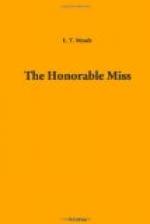“Beatrice, you are the most quixotic, extraordinary, unworldly, unpractical creature that ever breathed. What sort of guardian should I be if I listened to so mad a scheme? What right has Loftus Bertram to one farthing of your money, without you?”
“He can’t have it with me, Rector. I would not marry him now at any price.”
“Then he must do without the money.”
“No, he must have the money. Steps must be taken to secure it to him at once, and he must keep his wedding-day with Nina instead of me. Nina shall have my trousseau; we are exactly of one height—You have got to change the name in the marriage license. If that is impossible there shall be a special license. I am rich, I can pay for it. Oh, the joy that sometimes money brings!”
“My dear ward, you are a little off your head to-night. How could you possibly expect your guardian to be such a faithless old man.”
“Faithless? Mr. Ingram, have you quite forgotten my father?”
“No, Beatrice, I remember him to-night.”
“Let his face rise before you. Picture his face—his unworldly face.”
“I see it, Beatrice. Yes, Meadowsweet was not cankered by the sordid cares of life.”
“Truly he was not? Go on thinking about him. He made money. How did he spend it?”
“My dear child, your father was a very good man. His charities were extraordinary and extensive. He gave away, hoping for nothing in return; he was too liberal, I often told him so.”
“You were his clergyman and you told him so.”
A flash of indignation came out of Beatrice Meadowsweet’s eyes.
“I don’t think, Mr. Ingram, that a Greater than you has ever said that to my father.”
“Well, child, perhaps not. You reprove me, perhaps justly. Few of us have your father’s unworldly spirit.”
“Don’t you think his only daughter may inherit a little of it? Mr. Ingram, what is money for?”
“Beatrice, you could argue any one into thinking with you. But I must exercise my own common-sense.”
“No, you must not. You must exercise your unworldly sense, and help me in this matter.”
“What! And help you to throw away a quarter of your fortune?”
“I shall have fifteen thousand pounds left, more than enough for the requirements of any girl.”
“I doubt if the wording of your father’s will could give me the power for a moment.”
“I am sure it could. I am confident that in drawing his will he trusted you absolutely and me absolutely. He often spoke to me about money, and told me what a solemn trust riches were. He charged me like the man in the parable not to bury my talent in a napkin, but to put it out to usury. He said that he made you my guardian, because you were the most unworldly-minded man he knew, and he told me many times that although he could not give me absolute control of my money before I was twenty-one, yet that no reasonable wish of mine would be refused by you.”




